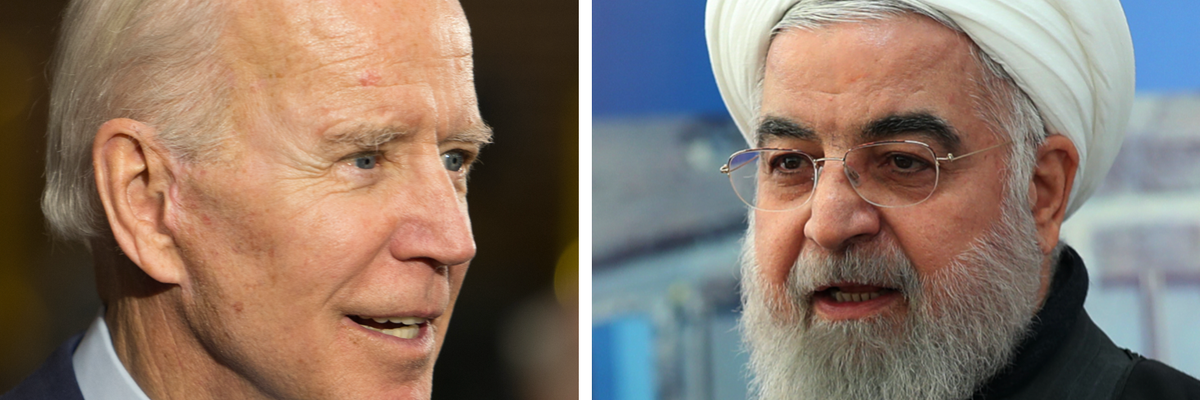Although Iran and the U.S. agree on the goal of reviving the Joint Comprehensive Plan of Action through a full return to commitments by all parties, they’ve hit an impasse on how to proceed.
The Iranians believe that the U.S. should make the first move by lifting sanctions since it was the Trump administration that withdrew from the deal in May 2018. Biden administration officials are unwilling to take an initial, unilateral step. Instead, they want to meet the Iranians first and work out the sequencing for a return to mutual compliance. The purpose of meeting first, they say, is to agree on a sense of direction, not to extract concessions. The Iranians are refusing to meet U.S. officials at this stage as it could be perceived as renegotiating the deal, which they say is out of the question.
Tomorrow’s meeting in Vienna tells us that the parties have managed to make some progress on two key sticking points — meeting format and who goes first.
The Europeans, along with the Chinese and Russians, have been meeting the Iranians, acting as interlocutors with Washington, in an attempt to bridge the communication gap. The in-person gathering in Vienna will follow the proximity talks model. All of the current parties to the JCPOA (the P4+1) along with the U.S. will send delegations, but the Iranians and Americans are not expected to meet face-to-face. Instead, the Europeans likely will shuttle back and forth to facilitate communications.
This is a creative attempt to overcome the current deadlock. It is a solution for now, but it’s not a long-term fix. Even with the best interlocutors, the possibility of miscommunications and misunderstanding is great. The Biden team should quickly pursue a realistic pathway to reestablishing direct, bilateral diplomatic communications with Iran. Given Iran’s political calendar, the goal should be to accomplish as much as possible before the Rouhani administration leaves office this summer.
It seems some progress also might be within reach on resolving the “who goes first” dilemma. A comprehensive implementation approach — whereby the U.S. and Iran will each produce a roadmap outlining the measures and timing for their full return to compliance — is promising because, at least in theory, it will provide clarity on the endgame. A simultaneous process means neither side has to go first. It’s hard to imagine the Iranians moving forward without knowing precisely when sanctions will be eased.
There are two potential serious bumps in the road ahead. First, some Iranian officials, including Supreme Leader Khamenei, have said that the lifting of all U.S. sanctions levied during the Trump administration must be verified before Iran will take any steps to come back into compliance. Adhering to this maximalist position is certain to lead to a stalemate. Second, so far, the Biden team has been vague about which sanctions and designations will be lifted. Is the intention to return to January 2017 and reverse all of the sanctions or only the nuclear/JCPOA-related sanctions? Failure to take a more expansive view on sanctions relief will severely limit the economic benefits Iran could expect to receive from complying with the JCPOA, which also would produce a stalemate situation. Resolving these issues are not insurmountable, but they will require direct, determined diplomacy.
Multiple members of the Biden team are on record calling maximum pressure a failure. They’re right — the Trump/Pompeo approach resulted in a sharp uptick in Iran’s nuclear activities and heightened tensions in the region, undermining U.S. interests on multiple fronts. Moreover, the misuse of sanctions has led to the needless suffering of ordinary Iranians, especially as they contend with a fourth wave of Covid. The Biden Administration has disassociated from Trump’s sanctions in words, but not in actions. Delaying the U.S.’s return to the JCPOA has been a miscalculation. Vienna is an opportunity for a course correction.
Putting Iran’s nuclear program back under tight constraints should be a top priority. Beyond this, U.S. reentry to the deal could help to achieve other desirable and important objectives, such as: negotiating a “longer and stronger” follow-on agreement to the JCPOA; reaching a political settlement to end the war in Yemen; developing regional support for an eventual U.S. withdrawal from Afghanistan; setting the stage for a broader regional discussion to limit ballistic missiles; and engaging the UN and others in seeking a long-term regional security structure.
A small window of opportunity to deescalate tensions and revitalize diplomacy prior to Iran’s presidential election in June is quickly closing. The pursuit of a strategic opening with Iran that begins with the reconstitution of the JCPOA offers a sound way to address the damage caused by Trump’s failed maximum pressure policies, pause hostilities while restarting talks, and set a foundation for more expansive U.S.-Iran dialogue on a range of issues.
















